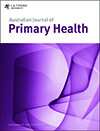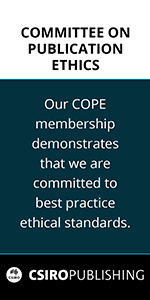Australian Journal of Primary Health
Volume 30
Number 5 2024
Making decisions to fund health services requires evidence that decision-makers consider relevant. This study identifies and defines factors of health services for Aboriginal and Torres Strait Islander children that influence funding decisions from the perspectives of decision-makers. Knowing the factors that decision-makers find useful when making decisions to fund health services can inform the types of measures that health services include in reports used to support applications for funding.
Primary care practitioners should be promoting dementia risk reduction as part of preventive care. Using a rigorous, theory-driven, evidence-based, stakeholder-informed approach, we developed an intervention for promoting dementia risk reduction that was acceptable, appropriate, feasible, and complemented by acceptable and appropriate implementation strategies. However, preventive interventions will not be taken up widely in general practice until they are prioritised above competing demands on resources.
Six new supplementary patient empowerment and health status measures proved reliable and, in combination with the PACIC+ psychometric tool, could offer a method to monitor and measure the self-management of chronic conditions in the Australian clinic setting and for future research.
Community health workers have been demonstrated in overseas research to play a key role in supporting patients to prevent hospital readmission. This role is now emerging in Australia especially for vulnerable and disadvantaged groups. This study identifies the key potential roles in the Australian context and the training and supervision required.
Chronic pelvic pain (CPP) is a common, debilitating condition. Sufferers present to healthcare professionals with variable complex symptoms and co-morbidities. This online survey demonstrated that Australian healthcare professionals (HCPs) demonstrated good knowledge of pain mechanisms, largely followed guideline recommended care, but lacked confidence treating patients with CPP. Patient experiences suggest discrepancy exists between HCPs beliefs and actual practice behaviours. A collaborative approach is needed to help guide targeted research and education to further improve confidence in the management of CPP.
General practice in outer metropolitan regions is unique. In GP registrars’ practice in these regions, fewer specialist, pathology and imaging referrals were generated, and care of older patients and Aboriginal and Torres Strait Islander patients was more likely than in inner metropolitan areas. Care of patients from non-English speaking backgrounds was more likely than in rural areas. A gradient (from inner metropolitan to outer metropolitan to rural regions) existed for many characteristics of registrars, practices, patients and clinical care.
Hepatitis C elimination in Australia is stalling. Primary care nurses are in regular contact with people with/at risk of hepatitis C and have a unique opportunity to contribute to the elimination effort. This study interviewed primary care nurses to identify the individual and systemic enablers that support these nurses to work to their full scope of practice and contribute to achieving Australia’s elimination goal.
Primary healthcare providers are usually refugee and asylum seekers’ first point of care in resettlement countries. Findings indicate direct professional experience characteristics influence healthcare providers’ knowledge and beliefs regarding refugee women’s sexual and reproductive health. Clinical practice changes and cultural competency training are needed to improve the preventive sexual and reproductive health care of refugee women and women seeking asylum.
Low cervical cancer screening rates in regional, rural and remote areas result in a higher rate of cancer diagnosis and death. General practice nurses when upskilled are able to address barriers to cervical screening, especially in regional and rural areas. Localised training courses may assist general practice nurses to be upskilled in their region.
Opioid-dependent individuals face substantial oral health challenges influenced by both opioid effects and lifestyle factors. This study investigated the oral health status and quality of life among opioid treatment program (OTP) clients, revealing prevalent dental caries and inadequate oral cleanliness, resulting in physical pain and psychological discomfort that impacted their quality of life. This identified correlation between oral health status and quality of life highlights the critical need for timely intervention to enhance the health and well-being of clients attending OTPs.
Without effective treatments, with emerging variants and waning immunity, vaccination remains our primary defence against COVID-19. Maintaining high population immunity is crucial. Both health facility and community-based approaches to vaccination yielded high satisfaction during the pandemic. It is recommended that the government prioritise and optimise these programs for future vaccination initiatives, especially during public health emergencies.
Here, we present the Consensus Reporting Items for Studies in Primary Care (CRISP) checklist, the first research reporting guide developed by and for the primary care research community.
The effectiveness of an asthma educational adjunct to standard management during a general practice visit is not well studied. A recent study in a Queensland general practice clinic examined the impact of a structured audio-visual educational session on asthma management and showed a significant improvement in Asthma Control Test scores in the intervention group compared to controls. This suggests the potential efficacy of such interventions in enhancing asthma control during general practice visits, although further multi-centre studies are necessary for conclusive evidence.
Paramedics are increasingly attending low- and medium-acuity patients, and paramedics in our survey self-reported that at least half of the patients they conveyed to an ED were appropriate for a primary care pathway. Notable barriers to primary care referrals included limited access to suitable primary care and fear of organisational repercussions or litigation following non-conveyance. This research has important implications for the educational, practical and organisational support given to paramedics regarding primary care diversion for suitable patients.





